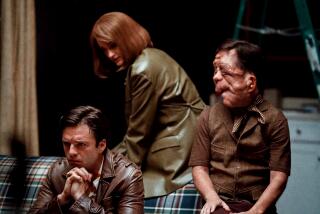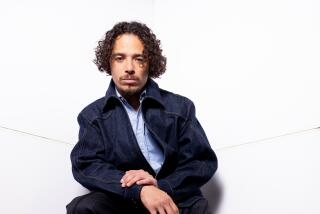For ‘Anomalisa’ star Tom Noonan, a Charlie Kaufman life
Several years after he released “What Happened Was,” an independent film about two lonely souls, in the mid-1990s, the actor-filmmaker Tom Noonan received a letter from a fan via his website. The man writing was a young screenwriter with a darkly absurdist streak, and he was curious to talk more about how to make a movie like the one Noonan had.
That fan was Charlie Kaufman, and the letter was the beginning of a relationship that would define Noonan — and, fittingly given the Kaufman connection, take a few more turns along the way. Noonan helped inspire Kaufman to pursue his own kind of honest storytelling, Kaufman would provide acting work to Noonan, and Noonan would even play an alter ego of sorts to the filmmaker in “Synecdoche, New York,” the “Adaptation” scribe’s directorial debut in 2008.
When Kaufman and Duke Johnson’s stop-motion animation tale “Anomalisa,” about a motivational speaker spending an eventful night in a Cincinnati hotel, opens on Wednesday, Noonan can count a new chapter in their relationship: He plays more than 40 voice roles in the film.
“Even I can’t tell if it’s me sometimes,” Noonan said of the extensive studio-recording process. “I mean, I recognize the voice, but I’m not sure where it came from.”
See more of Entertainment’s top stories on Facebook >>
Oh, and since this is an off-kilter Kaufman-Noonan collaboration, all those characters sound (almost) exactly the same.
Known for its soothing timbre, Noonan’s voice serves a key psychological function in “Anomalisa” — it illustrates, sonically, how protagonist Michael (David Thewlis) has stopped experiencing the world with any kind of richness or diversity. So a bellhop, an ex-girlfriend, a hotel guest, a cab driver, a young child and many others all take Noonan’s vocal guise.
“To try to continue internally being that person without doing accents or inflections was not easy,” said Noonan, noting that Kaufman strongly advised against any of those. “It’s very confusing, even now. I know what [an ex-girlfriend] feels like or a kid feels like or a hotel manager feels like that. But there’s no way of expressing that 99% of the time. Did it work? I can’t really say.”
That artistic attitude — bold experimentation accompanied by a shrug on what any of it means—may remind of a certain filmmaker. Noonan and Kaufman are simpatico in many ways. The actor, 64, is also colorful and direct. Like Kaufman, he has a dark worldview, an idiosyncratic sensibility, blackly comic thoughts and, at times, an endearing crankiness. He is, in a way, Charlie Kaufman without the fame of being Charlie Kaufman.
To many consumers of film and television, Noonan would be known instantly even if they didn’t know him at all. The actor had a notable turn on “Louie” (as a medical doctor who walks children through the pathology of the Jesus crucifixion with a G-man deadpan-ness) and played a serial killer in Michael Mann’s 1980s-era classic “Manhunter”; he was the striving soul in his own Sundance-winning “What Happened Was” and the man who wanders into the third act of “Synecdoche” when things really become unglued.
SIGN UP for the free Indie Focus movies newsletter >>
As a kind of quintessential character actor, Noonan has most frequently played a kind of coolly implacable evil — roles in “The Black List,” “Last Action Hero” and the horror flick “The House of the Devil” all speak to that — though this is hardly his only gear, as anyone who has seen his work as the morally conscious Rev. Nathaniel Cole in the period AMC series “Hell on Wheels” could tell you.
“I wish I had more success as an actor,” he said, with some charactertistic melancholy. “I think people call me because they’re channel surfing late at night and they see me in a movie on cable.”
As “Anomalisa” begins to take off — it won a top prize at Venice and has earned hardcore fans and warm critical notice since — it is showing the world Noonan’s subtle skills. But, as this is Noonan, it is not really showing them; after all, his official character credit (“Everyone Else”) is inherently anonymizing.
Noonan performed the part(s) in Kaufman’s 2005 live staging. He was able to use some more voices and other sounds there, along with some physical acting, an experience he said “made it a little more fun than the movie, though I probably shouldn’t be saying that while doing an interview for the movie. But ultimately, he said, the fun and challenge was to offer shadings of these characters without using falsettos or other tricks.
Kaufman said that he was struck by Noonan’s approach, the actor’s distinct voice gently morphing from one moment to the next. “There’s something about the way Tom does the part that’s specific and recognizable [in all of the roles] while not being tedious,” Kaufman said in a phone interview. “And the virtuoso thing is he does it all in real time.” All of the voices for the film — there were actually as many as 70 in the initial mix — were recorded over just two days at a Southern California studio.
(The idea of using the same voices in in keeping with the movie’s leitmotif of of a Fregoli Delusion, a rare psychological condition in which the sufferer believes everyone around him is simply a different forms of the same person; the notion is hinted at in the name of the movie’s hotel, The Fregoli.)
At the moment, the 6’ 5” Noonan is far from Midwestern lobby bars, lankily folded into a couch in his small and spare East Village apartment. He acquired it free in a land swap with the city, part of a bohemian life that doesn’t seem to exist much anymore in New York, let alone for veteran actors of a certain age. People with dozens of film and TV credits tend to live in stolid apartments on the Upper West Side or Santa Monica, not a tenement with minimal furniture, don’t they?
But Noonan has always done things his own way. He runs a theater across the street where he workshops his ideas—a recent effort is “The Shape of Something Squashed,” a kind of backstage existential tale set in the theater world that he also has begun turning into a movie--and developed an eclectic group of friends from working on so many sets over the years. Among them: James Gandolfini (“a wonderful man—so much energy and passion”) and Vin Diesel (“we talk a lot about life and career—he likes to text me.”)
He is very fond of Louis C.K, “though I’m not sure he’d know I’m still acting.”
With black Skechers, a baggy green sweatshirt and standard-issue black slacks with bottoms that appear to be shark-eaten from heavy wear, Noonan cuts an ordinary figure, underlined by some eccentric habits.
He makes it a policy not to read the script for any part he’s given. In fact, he barely reads past the lines he has to learn. (His theory is that context bleeds out spontaneity; going against the grain, of both the work and the other actors, is almost always more interesting.) “My job as an actor is not to elucidate the script — it is to be compellingly present,” he said.
When Noonan turned up to a guest part on the “Damages” set and burst into his lines, some members of the crew began laughing because they thought it was out of keeping with the rest of the scene, a moment that prompted star Glenn Close to come to his defense. “I never read the scene. I never even saw the show,” he said “I just showed up the first day.”
He said this isn’t a problem for directors — the good ones, anyway — who care a lot more about a robust performance than whether an actor “inhabits the role” or the other stuff of other acting-school bromides.
Besides, it works for him. “When I do a movie and I don’t know why I’m saying something is when I’m truly happy.”
It is one of a number of provocative statements from Noonan, who grew up in Connecticut with a mother and large extended family (his father died when he was relatively young).
Over the course of a two-hour conversation, he also offers that “love is a construct, what people tell themselves to distract themselves from the fact that they’re always a little bit out of control.”
Loneliness and inauthenticity abound in this universe, the philosophy goes, and the best way to ward it off is simply to be as aware of it as possible. “I think 99% of what people say is overcompensation,” he said “They’re saying what they think will help them, because if you actually said what you mean you’d be at a huge disadvantage.”
When asked if that, in a sense, was its own own kind of positioning, he flashed a wary look and replied. “Now you’re playing some kind of game.” It was unclear if that was also a form of positioning.
For his part, Kaufman says that the mixture of mischief and intellectual honesty is what drew him to Noonan. “There is something kid-like about Tom,” Kaufman said. “He believes what he’s saying when he says these things but he also knows that it’s a provocation.” (The pair, inspired by those around them taking to their playfully insulting banter, are contemplating a project along the lines of Michael Winterbottom’s “The Trip” that sees them playing versions of themselves in exaggerated real-life situations.)
Noonan acknowledges that “I can be a bit difficult, but I do think life is more fun where there are jokes and challenges.” He says that approaching Hollywood with the requisite humor can be a struggle; the life of a character actor is rarely as smooth as it might seem from the outside.
A recent nadir came when his agent called him with what appeared to be a part in the “Mockingjay” movie of “The Hunger Games” series. He was befuddled, though, when the pages sent him included only one part for a man of his age — Donald Sutherland’s President Snow. It turned out he wasn’t being considered for a part at all — Jennifer Lawrence and other actors needed merely someone to rehearse with them for a week while Sutherland was unavailable.
That incident sent Noonan into a brief tailspin. But it also motivated him, and he banged out the script for “Squashed” in its wake. (He has shot the stage performance and has hopes for film or television, even after a meeting over a potential deal with an unnamed production company went south after it was clear they wanted it to be a madcap, hijinks-filled backstage comedy instead of the more elegiac tale he imagined.)
Some of these frustrations have helped him with “Anomalisa,” in which disconnection and a (perhaps justified) misanthropy are big themes.
Noonan said the reaction he’s encountered since he began promoting the film at festivals in the late summer has been unusual.
“My experience talking about the movie is that even though my characters are treated like ... by Michael in every scene, people still side with him.”
“But then,” he continued, “that’s what life is — anonymous characters in the background who are been mistreated. We’re all that — the person on top of the float in the parade is up there, saluting and waving, while we’re being crushed under the wheels.’
You Might Also Like:
Charlie Kaufman breaks own terms in ‘Anomalisa’
Kickstarter film festival highlights site’s tricky role
How Charlie Kaufman’s ‘Anomalisa’ blossomed into a darkly original animation
More to Read
Only good movies
Get the Indie Focus newsletter, Mark Olsen's weekly guide to the world of cinema.
You may occasionally receive promotional content from the Los Angeles Times.









